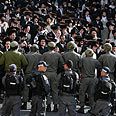
Nofrat Frankel
Photo: Dudi Vaaknin

Haredi protest near Intel plant
Photo: Gil Yohanan
Today I usually feel pretty lucky. On Nov 25 each year, International Day for the Elimination of Violence against Women, supportive media will show us statistics about rape, wife-murder, and domestic violence. It’s all horrible, and I spend a lot of my personal and professional life working on these issues. But usually, I can come back home and take a deep breath.
Thank God, I think, I’ve never been beaten by my spouse, or by anyone else, under my own roof. I’ve never been abused by a partner (though by others, yes), I’ve never been raped, (though sexually assaulted, yes), I’ve never had to go to a police station or a hospital or a courtroom on my own behalf as a result of violence (though I’ve been for other women.) So I have always counted my blessings.
Because it always seemed like such a private thing, violence against women. So much of it happens behind closed doors, or in dark alleyways. I mean, that’s the whole rationale behind this day: since the violence is usually private, only a public outcry can provide protection for those who need help. If we open those doors, if we scream about it, then maybe the public space can be a safe haven for all those women suffering privately.
But this year, something has changed. There is something about trends in violence against women in Israel that make me feel truly unsafe. Violence against women has become part of the public display in parts of Israel. It has become acceptable in some areas, and legitimized. Women who are beaten, spat upon, thrown acid upon – all in public – are cast aside. The perpetrating men are heroes and the women are left to lick their wounds, in private, alone.
I’m talking of course about the Edah Haredit and its surrounds. I’m talking about violence against women on buses, on the streets, in stores, and at the Kotel. I’m talking about where violence has become the normative way to force the public space to conform to the most radical versions of gender.
The latest victims (that we know of) are Nofrat Frenkel, who dared to wear a tallit at the Kotel, and all the women (and men) working at Intel whose entire livelihoods are at risk because of haredi violence. Intel CEO Maxine Fassberg is fighting to protect an entire company from haredi violence, another woman left to her own devices against the madness.
No fear
The reason why this is so frightening is precisely because it is so public. There is no fear – no fear of the law, no fear of retribution, and clearly no fear of women fighting back. A man can throw acid on a woman or push her down on a bus and know fully in his heart that nothing will happen to him. On the contrary, he will be embraced by his entire community, lauded by his leaders who may wear religious garb but are far from the Divine. No fear of God either, as it were.
This is a threat to all of us. If men take ownership of women’s body on the street, that affects all of us. Indeed, the freedom with which the Edah Haredit stakes claims on women’s body is reminiscent of Susan Faludi’s Backlash, filled to the brim with descriptions of the ways in which the woman’s body has become public property in the States, especially pregnant women, especially low-income women.
Here, in Israel, the threat of turning a woman’s body into a public artifact is even worse. She doesn’t have to be pregnant, or trying to get birth control or an abortion, or even speaking out. A woman, in order to be at risk of major bodily harm, simply has to be standing in the street. If she happens to be standing in a “man’s spot” or happens to be wearing something deemed unworthy, then publicly hurting her is given legitimacy. This impacts all women, all the time.
If we allow violence against women to continue to overtake public space, if the most radical elements of society are given a “free rein” to forcibly coerce the public Israel into submission, then that is a threat to all of us. Even women, like me, who generally feel safe at home, will no longer feel safe outside of the home. That’s exactly how the Taliban started in Afghanistan. The parallels are absolutely frightening.
And of course, it must be said on this day of the struggle against violence against women: if this is what men do in public to women whom they don’t know, one can only wonder what they are doing to the women in their own homes under their own roofs, when nobody is watching except God.
Dr. Elana Maryles Sztokman is a writer, researcher, educator and activist. She works at Mavoi Satum (www.mavoisatum.org) on behalf of agunot, lectures at the Schechter Institute for Jewish Studies, and blogs at www.elanasztokman.com















